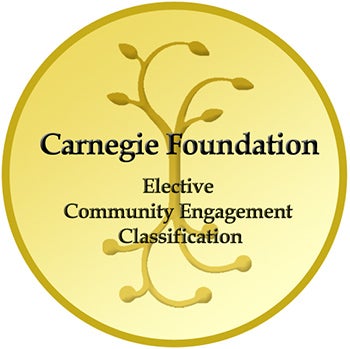‘PROMISE TO THE PUBLIC’
ECU receives Carnegie classification for community engagement
East Carolina University has earned higher education’s top honor for community engagement.
The Carnegie Foundation for the Advancement of Teaching announced Jan. 7 that ECU received the 2015 Community Engagement Classification.
ECU first received the designation in 2008. The re-classification – the first offered by the foundation – is valid for 10 years.

“We do public service because it is our mission and it makes a positive difference for North Carolina,” said Chancellor Steve Ballard. “We don’t do it to gain recognition, but it is nice when our peers recognize our efforts.”
Carnegie noted in their selection letter that ECU showed “excellent alignment among campus mission, culture, leadership, resources and practices that support dynamic and noteworthy community engagement.”
The classification “is a demonstration of ECU’s promise to the public to continue to work with our community partners to solve issues that are important to them,” said Dr. Beth Velde, former director of public service and community relations at ECU. “It demonstrates that community engagement is present across the entire campus.”
The work supports the university’s mission to be a national model for student success, public service and regional transformation, and ECU’s motto, Servire, she said.
From coordinating nutrition-focused programs to addressing health issues prevalent in eastern North Carolina to leading art projects at community local centers, ECU students and faculty members are working with community partners on a range of projects. The work advances scholarship by linking theory and practice across a wide range of academic disciplines through engagement and outreach, course work and service.
“University-community partnerships are important because of the mutual benefits that result,” said Dr. Sharon Paynter, interim director of public service and community relations at ECU. “The Carnegie classification recognizes the hard work and commitment of ECU faculty, staff, and students as well as our community partners.”
snackrx

A child at the Farmville Boys and Girls Club enjoys healthy snacks provided by Snack RX, a program offered by nutrition science students in ECU’s College of Human Ecology. The program reaches more than 350 children in weekly programs at all Pitt County Boys and Girls Clubs.
In 2013-14, more than 10,200 ECU students worked on projects through community-based learning, service-learning, internships and capstone courses.
As part of the application process, the university submitted documentation describing the nature and extent of its community engagement, Velde said.
Since 2008, ECU showed sustained growth in several key areas including student involvement in community-based learning and engagement through internships, fieldwork, cooperative education and practice-based experiences, Velde said.
“The importance of this elective classification is borne out by the response of so many campuses that have demonstrated their deep engagement with local, regional, national and global communities,” said John Saltmarsh, director of the New England Resource Center for Higher Education, Carnegie’s partner in administering the Community Engagement Classification process. “These are campuses that are improving teaching and learning, producing research that makes a difference in communities, and revitalizing their civic and academic missions.”
More than a dozen universities in North Carolina were re-classified this year, and two were named community engagement classification institutions for the first time. ECU is one of 361 institutions in 33 states and U.S. territories that hold the designation. A listing can be found at http://www.nerche.org.